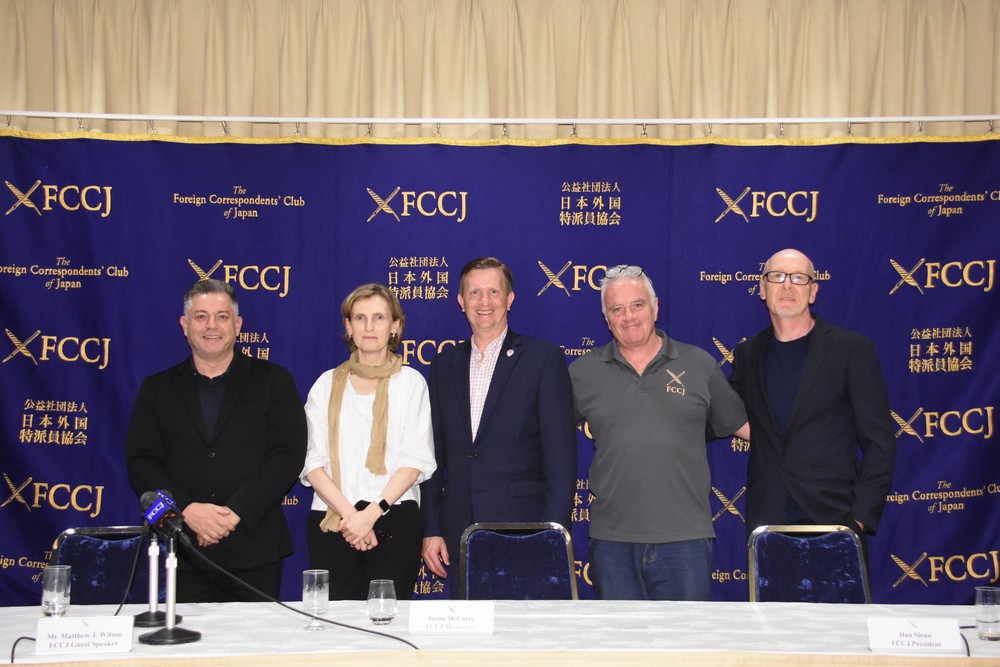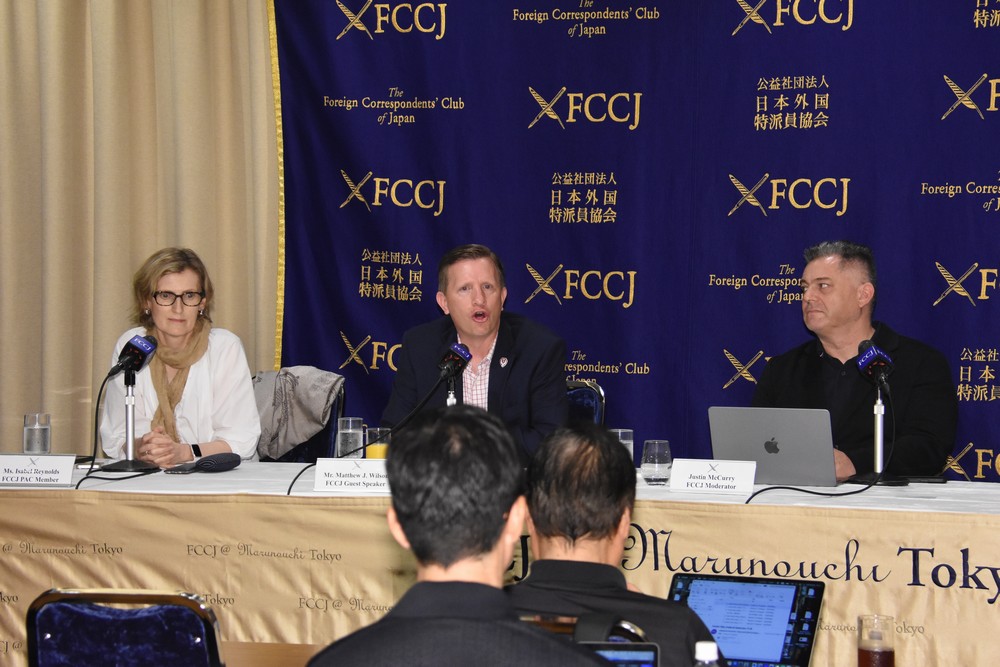Issue:
October 2025 | Journalism Education
A formal qualification isn’t always the best route into a media career, panelists tell FCCJ event

The club hosted a panel discussion in September on the future of journalism education in Japan, featuring best practices in newsrooms, media literacy and the challenge of Artificial Intelligence.
The panel comprised experienced journalists and academics, including those who teach journalism and media studies. I was among the speakers, having taught at three Japan-based universities and spent decades working with graduates from Japan and overseas.
The other panelists were Matthew Wilson, dean and president of Temple University’s Japan campuses, Isabel Reynolds, Bloomberg’s Tokyo bureau chief and former FCCJ president, and David McNeill, a professor at the University of the Sacred Heart in Tokyo and co-chair of the FCCJ Freedom of the Press Committee. The discussion was moderated by Justin McCurry, Japan and Korea correspondent for the Guardian.
One of the tenets of the Japan-based media is that newspapers, magazines, networks and online sites are reluctant to hire journalists, preferring those who have a clean professional slate and do not need to be “de-programmed”. Some newsrooms go as far as turning away candidates with postgraduate journalism qualifications in favour of hires who go straight into their own training programs.
Foreign media companies, on the other hand, welcome candidates with experience in writing, editing, presentation, video and audio production, as well as the critical thinking needed to flourish in the profession.
The divide also reflects the different ways in which Japanese and overseas media go about their reporting and the respective value they place on independent thought among their journalists. But there are also skills that are needed to succeed irrespective of location, not least the ability to write clearly and a willingness to multitask.
Several universities in Japan offer communications, media production, or journalism courses. Undergraduate and graduate majors at more traditional institutions can be found at the universities of Sophia, Waseda, Komazawa, Kansai, Tokyo, Doshisha, and Tokyo Tech. Nihon University also offers extracurricular opportunities in newspapers, broadcasting, publishing, and cinema, while its graduate school, along with Temple, Lakeland University Japan and others, hire journalists to teach students.
Wilson, though, said entry into journalism wasn’t necessarily determined by a graduate’s chosen academic discipline.
“When I look at our most popular majors … number two is communications,” he said. “As you peel back the communications major … I don’t have a lot of students sharing that they want to go into the profession of journalism.
“We regularly have students becoming journalists here in Japan or elsewhere, but they tend to be coming from our international affairs department. It’s really somebody (who is) wrapped up in global affairs that have their eyes open to the differences they can make in the world through investigative reporting.”
Reynolds said that mirrored the experience with interns and new hires at Bloomberg, which often takes on candidates with no formal training or background in journalism.
“We take on new graduates almost every year and have interns every summer, so I’m part of their training,” she said. “When we have interns coming in, often there are one or two from a different (educational) department, but they really want to come into news.”
Looming in the background for students is a profession that has seen considerable industry consolidation in recent years, often has a limited vocational window and faces fierce competition from non-traditional media organisations, according to McNeill.

“We’re in an odd and worrying phase for journalism, because there’s never been a greater need for fact-based, accurate journalism, but the industry itself seems to be crumbling,” he said. “When I was in the UK, I taught media studies, and the assumption was that a large number of students would go into journalism or the media industry. In practice, a lot went into PR.”
McNeill said the focus of his university instruction had changed. “I teach less media studies and journalism, although it is a component,” he said. “Now I teach media literacy, which is a way of saying to students, ‘Look, you probably won’t end up getting a job.’”
He added: “I ask the students to think reflectively about the role of the media and why we need the media.”
In terms of Japan-based schools, Sophia University, which offers graduate and undergraduate degrees in journalism and media studies, has had a journalism department for 93 years – the oldest in the country. Students undertake basic research, TV production, and media literacy courses in the first year. Classes become more focused from the second year, with instruction in journalism and mass media history, theory studies, and seminars focusing on print, broadcasting, publishing, and foreign journalism.
The panelists noted that rapid changes in technology and the volume of available content on social media had blurred the value and necessity of fact-based journalism.
AI-assisted content creation is impacting how people access and interact with traditional and social media content, prompting some potential students to question the value of all higher education, not just journalism, according to Wilson.
“I started to talk a lot as university president about the role of higher education and schools,” he said, adding that the advent of AI had led some students to think they “don’t need an education … don’t need to be trained.
“As educators, we need to be teaching our folks about how to extract the facts, how to spot the facts, how to identify and confirm those, because AI is going to spit out all this information.”
Wilson said his university emphasized PI - Practical Intelligence. “That’s where your critical thinking skills come in, communication skills, investigative journalism. That’s what we need to be putting out there.”
Dan Sloan is president of the FCCJ

